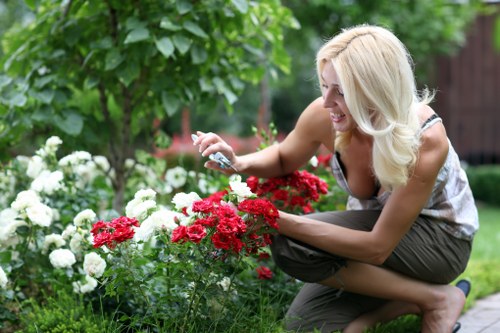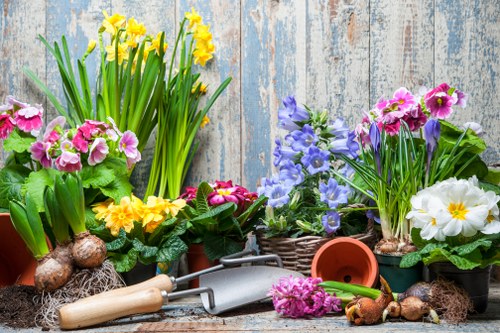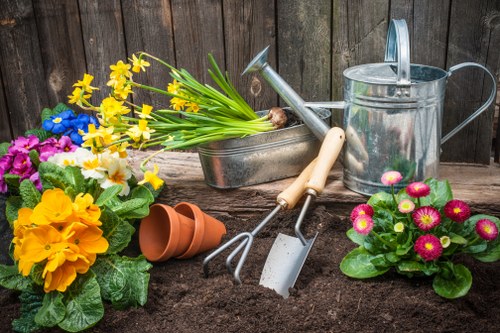Garden Maintenance in Mill Hill: Keeping Your Green Space Pristine
Introduction to Garden Maintenance

Maintaining a beautiful garden in Mill Hill requires dedication, knowledge, and the right strategies. Whether you're a seasoned gardener or a beginner, understanding the essentials of garden upkeep can transform your outdoor space into a vibrant and inviting haven.
Garden maintenance involves a series of tasks that ensure your plants thrive, your landscape remains orderly, and your garden continues to be a source of joy and relaxation. From pruning and weeding to lawn care and pest management, each aspect plays a crucial role in the overall health of your garden.
In this comprehensive guide, we'll explore the key areas of garden maintenance specific to Mill Hill's climate and soil conditions, providing you with actionable tips and expert advice to keep your garden in top shape all year round.
Understanding Mill Hill's Climate for Effective Garden Care

Mill Hill enjoys a temperate climate, characterized by mild winters and warm summers. This climate is conducive to a wide variety of plants, but it also presents unique challenges that gardeners must navigate.
One of the primary considerations for garden maintenance in Mill Hill is understanding the local weather patterns. The area receives a moderate amount of rainfall throughout the year, which affects soil moisture levels and plant health. Proper drainage is essential to prevent waterlogging and root diseases.
Additionally, the region experiences seasonal changes that impact plant growth cycles. Knowing when to plant, prune, and harvest can make a significant difference in the success of your garden. Tailoring your maintenance schedule to Mill Hill's specific climate ensures that your garden remains resilient and flourishing.
Essential Garden Maintenance Tasks

Effective garden maintenance encompasses a variety of tasks that collectively contribute to the health and beauty of your outdoor space. Here are some essential activities to incorporate into your routine:
- Pruning: Regular pruning helps maintain plant shape, encourages healthy growth, and prevents diseases by removing dead or diseased branches.
- Weeding: Keeping weeds at bay is crucial as they compete with your plants for nutrients, water, and sunlight.
- Lawn Care: Mowing, aerating, and fertilizing your lawn promote thick, healthy grass that serves as the foundation of your garden.
- Pest Management: Identifying and controlling pests early can prevent significant damage to your plants.
- Soil Health: Regularly testing and amending your soil ensures that it has the necessary nutrients and pH balance for optimal plant growth.
Incorporating these tasks into your garden maintenance routine will help you create a thriving and aesthetically pleasing garden in Mill Hill.
Seasonal Garden Maintenance

Each season presents its own set of challenges and opportunities for garden maintenance. Adapting your care strategies to the changing seasons ensures that your garden remains healthy and beautiful throughout the year.
Spring Maintenance
Spring is a time of renewal and growth. Focus on preparing your garden for the upcoming growing season by clearing out winter debris, planting new flowers and vegetables, and fertilizing your soil. Pruning dormant trees and shrubs also encourages robust growth.
Summer Maintenance
During the summer months, attention shifts to watering, weeding, and pest control. Regular watering is essential, especially during dry spells, to keep your plants hydrated. Maintaining a regular weeding schedule prevents unwanted plants from taking over your garden beds.
Autumn Maintenance
Autumn is the perfect time to prepare your garden for the colder months. Rake fallen leaves, mulch garden beds, and plant perennials. This season is also ideal for pruning certain trees and shrubs to promote healthy growth in the spring.
Winter Maintenance
In winter, focus on protecting your plants from frost and cold temperatures. Use covers or mulches to insulate sensitive plants and ensure that your garden tools are cleaned and stored properly. Planning for the next gardening season during this quiet period can set the stage for future success.
Choosing the Right Plants for Mill Hill Gardens

Selecting the appropriate plants is fundamental to successful garden maintenance. In Mill Hill, the climate and soil conditions favor a diverse range of flora, allowing gardeners to experiment with various species.
When choosing plants, consider factors such as sunlight exposure, soil type, and water requirements. Native plants are often a good choice as they are well-adapted to the local environment and require less maintenance. Additionally, incorporating a mix of annuals and perennials can provide continuous color and interest throughout the seasons.
Consulting with local nurseries or gardening experts can help you select plants that thrive in Mill Hill, ensuring that your garden remains vibrant and low-maintenance.
Efficient Irrigation Systems

Proper watering is a cornerstone of effective garden maintenance. Implementing efficient irrigation systems can save time and resources while ensuring that your plants receive the right amount of moisture.
Drip irrigation and soaker hoses are excellent options for targeted watering, minimizing water waste, and reducing the risk of fungal diseases caused by overhead watering. Installing a smart irrigation controller can automate watering schedules based on weather conditions, further enhancing efficiency.
Regularly checking and maintaining your irrigation system ensures that it operates effectively, providing consistent hydration to your garden without overwatering or underwatering.
Soil Management and Fertilization

Healthy soil is the foundation of a thriving garden. Proper soil management and fertilization provide plants with the necessary nutrients to grow strong and resist diseases.
Conducting soil tests helps you understand the pH levels and nutrient content, allowing you to amend the soil accordingly. Adding organic matter such as compost improves soil structure, enhances drainage, and boosts microbial activity.
Choosing the right fertilizer based on your soil test results ensures that your plants receive balanced nutrition. Applying fertilizers at the appropriate times, such as during planting and active growth periods, maximizes their effectiveness.
Pest and Disease Control

Maintaining a healthy garden involves proactive pest and disease management. Identifying issues early and implementing appropriate control measures can prevent widespread damage.
Regularly inspecting your plants for signs of pests or diseases allows for timely intervention. Utilizing integrated pest management (IPM) strategies, which combine biological, cultural, and chemical controls, promotes sustainable and eco-friendly solutions.
Encouraging beneficial insects, such as ladybugs and praying mantises, can naturally reduce pest populations. Additionally, practicing good garden hygiene by removing dead plant material and avoiding over-fertilization minimizes the risk of disease outbreaks.
Pruning and Trimming Techniques

Pruning and trimming are essential practices for maintaining the shape, health, and productivity of your plants. Proper techniques ensure that plants receive adequate sunlight, air circulation, and resources.
Different plants require specific pruning methods. For example, flowering shrubs benefit from pruning immediately after blooming, while fruit trees are best pruned during their dormant season. Learning the correct timing and approach for each plant type enhances their growth and longevity.
Using sharp, clean tools reduces the risk of transmitting diseases and ensures clean cuts that promote healing. Consistent pruning also helps manage plant size, preventing overgrowth that can lead to structural issues and increased maintenance needs.
Lawn Care Best Practices

A well-maintained lawn serves as the centerpiece of your garden, providing a lush and inviting space for relaxation and recreation.
- Mowing: Regular mowing at the appropriate height encourages healthy grass growth and prevents weed establishment.
- Watering: Deep, infrequent watering promotes deep root systems, enhancing drought resistance.
- Fertilizing: Applying the right type and amount of fertilizer supports vigorous growth and color.
- Aeration: Aerating the soil reduces compaction, allowing better air, water, and nutrient penetration.
- Overseeding: Introducing new grass seeds fills in bare spots and improves lawn density.
Implementing these lawn care practices ensures a resilient and attractive lawn that enhances the overall appearance of your garden.
Mulching for Garden Health

Mulching is a simple yet effective technique that benefits both the aesthetics and health of your garden.
Applying a layer of mulch around your plants helps retain soil moisture, suppress weeds, and regulate soil temperature. Organic mulches, such as bark, straw, or compost, also improve soil fertility as they decompose.
Proper mulching techniques involve spreading a 2-3 inch layer of mulch, ensuring it doesn't touch the plant stems or trunks to prevent rot and pest issues. Regularly replenishing mulch as it breaks down maintains its effectiveness and appearance.
Garden Tool Maintenance

Maintaining your garden tools is crucial for efficient and safe gardening practices. Well-maintained tools not only perform better but also last longer, saving you time and money.
After each use, clean your tools thoroughly to remove dirt and debris. Sharpen blades regularly to ensure clean cuts, which reduce plant stress and the spread of diseases. For wooden handles, check for cracks or splinters and replace them as needed to maintain tool integrity.
Storing your tools in a dry, organized space protects them from rust and damage. Investing in quality tools and taking care of them properly enhances your garden maintenance experience.
Incorporating Sustainable Practices

Adopting sustainable gardening practices contributes to environmental health and can reduce your garden's maintenance requirements.
Consider using native plants that require less water and are more resistant to local pests. Implementing rainwater harvesting systems collects natural water resources, minimizing reliance on external watering sources.
Composting kitchen and garden waste recycles nutrients back into the soil, reducing the need for synthetic fertilizers. Additionally, using organic pest control methods preserves beneficial insects and promotes biodiversity in your garden.
By integrating these sustainable methods, you create a garden that is both beautiful and environmentally responsible.
Seasonal Planting Schedules

Planning your planting schedule according to the seasons ensures that your garden remains productive and aesthetically pleasing throughout the year.
- Spring: Plant annuals, vegetables, and perennials. Start seeds indoors for early blooms.
- Summer: Focus on maintaining established plants, harvesting vegetables, and managing pests.
- Autumn: Plant bulbs for spring flowers, sow cover crops, and prepare beds for winter.
- Winter: Prune dormant plants, protect sensitive species, and plan for the upcoming gardening season.
Adhering to a seasonal planting schedule aligns your gardening activities with natural growth cycles, enhancing plant health and garden beauty.
Enhancing Garden Aesthetics

Aesthetics play a significant role in garden maintenance, transforming your outdoor space into a visually appealing retreat.
Plant Arrangement and Design
Thoughtful plant arrangement and design create balance, harmony, and visual interest. Consider the height, color, and texture of plants when planning your garden layout. Grouping plants with similar needs together simplifies maintenance and promotes healthy growth.
Garden Features
Incorporating features such as pathways, benches, fountains, and sculptures adds character and functionality to your garden. These elements not only enhance the visual appeal but also provide spaces for relaxation and enjoyment.
Lighting
Proper lighting extends the usability of your garden into the evening hours and highlights key features. Solar-powered lights, string lights, and lanterns create a warm and inviting ambiance while promoting safety and security.
Dealing with Common Gardening Challenges

Gardening in Mill Hill comes with its set of challenges, from unpredictable weather to dealing with invasive species. Being prepared to tackle these issues ensures that your garden remains healthy and thriving.
One common challenge is managing pests that can quickly damage plants. Implementing preventive measures, such as proper sanitation and the use of natural repellents, can mitigate infestations.
Another challenge is coping with fluctuating weather conditions. Providing adequate shelter for plants, using windbreaks, and selecting resilient plant varieties can help your garden withstand adverse weather.
Professional Garden Maintenance Services

While DIY garden maintenance is rewarding, sometimes enlisting professional help can elevate your garden's upkeep.
Professional garden maintenance services in Mill Hill offer expertise in plant care, landscape design, and specialized tasks such as irrigation system installation and soil remediation. These services save you time and ensure that your garden receives the attention it deserves.
Hiring professionals allows you to focus on enjoying your garden rather than being bogged down by maintenance duties. Whether you need regular upkeep or assistance with a specific project, professional services can tailor solutions to meet your garden's unique needs.
Contact us today to learn more about our garden maintenance services and how we can help you achieve the garden of your dreams in Mill Hill.
Conclusion

Maintaining a garden in Mill Hill is a fulfilling endeavor that combines creativity, dedication, and knowledge. By understanding the local climate, selecting the right plants, and implementing effective maintenance practices, you can cultivate a garden that is both beautiful and resilient.
Whether you're managing the tasks yourself or seeking professional assistance, the key to successful garden maintenance lies in consistent care and thoughtful planning. Embrace the joys of gardening and transform your outdoor space into a thriving oasis.
Book your service now and take the first step towards a stunning and well-maintained garden in Mill Hill.

